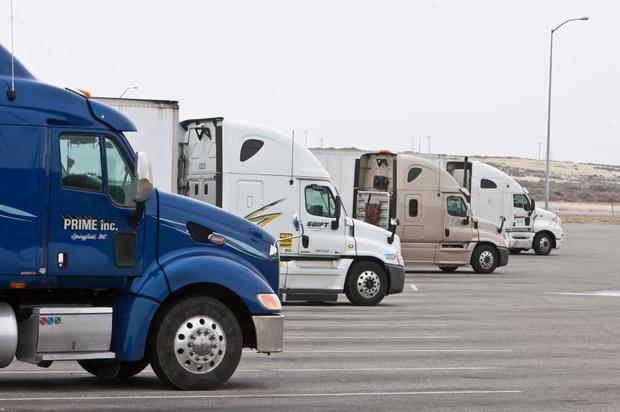The U.S. Department of Transportation proposed the rule to force drivers to switch from paper to digital travel logs in an effort to reduce trucking accidents, including those caused by fatigued drivers.
The department says the rule would simplify the monitoring of time truckers spend on the road and the reprimanding of those who log too many hours. Impaired driving, including fatigue, was listed as a factor in more than 12 percent of the 129,120 crashes involving large trucks or buses in 2012, the department says. The proposed rule would make it harder for drivers to misrepresent their time on logbooks and avoid detection by authorities.
Department analysts predict the change would prevent 20 fatalities and 434 injuries each year.
Most large trucking companies in Idaho have already switched to logging trips on digital notepads, says Julie Pipal, president and CEO of the Idaho Trucking Association.
“Many drivers objected at first, but when they got the hang of it, they liked that they didn’t have to do paper anymore,” she says.
Pipal says some small trucking-company owners groan at the mandate, which most in the industry expect to be published to the Federal Register by the end of the year. The proposal could still be changed.
“Where you get pushback comes when the mandate becomes a one-size-fits-all blanket,” Pipal says. “The smaller companies are overwhelmed by the amount of regulations it takes them to operate. Additional regulations like this just feel like heaping on.”
Custody of the electronic records would remain with truckers and their employers, as paper logs do today. The records would be available to law enforcement and regulators during roadside inspections, compliance reviews and post-crash investigations. The log laws apply to trucks traveling at least 150 miles.
Pipal says trucking companies can convert to electronic log keeping for as little as $100 per truck.
“When we go to trucking exhibitions, [electronic logging software companies] are all lined up, trying to sell their wares to the next carrier that comes along,” Pipal says.
The rule would also establish a procedure for a driver to file a harassment complaint against a carrier who orders trips that require drivers to break hours-of-service rules or to operate a vehicle while fatigued. The proposal will ensure drivers can access their records and will require logging devices to include a mute function to protect against sleep disruptions, the department says.
Frank Buell, owner of Buell Trucking in St. Maries in northern Idaho, says electronic logging systems will probably save his company money and reduce paperwork clutter. His company employs 200 people and operates 300 trucks, including 30 log trucks.
“We don’t really want Uncle Sam knowing our business,” Buell says. “But if you’re running a clean business, you don’t have anything to hide.”
GPS & Track is excited to introduce our new platform for Hours of Service regulations. Our HOS solution ensures that drivers and fleet managers are FMCSA-compliant. Eliminate time-consuming manual logs and help your drivers, and your company, stay in total compliance. The GPS and Track’s HOS solution will help you minimize your financial risk, by avoiding hefty fines and other possible penalties related to non-compliance. Click here to learn more!

CHRIS BUTLER — Statesman file
Zach Kyle: 377-6464. Twitter: @IDS_ZachKyle. This story is part of the Oct. 21-Nov. 17, 2015 edition of the Statesman’s Business Insider magazine.
